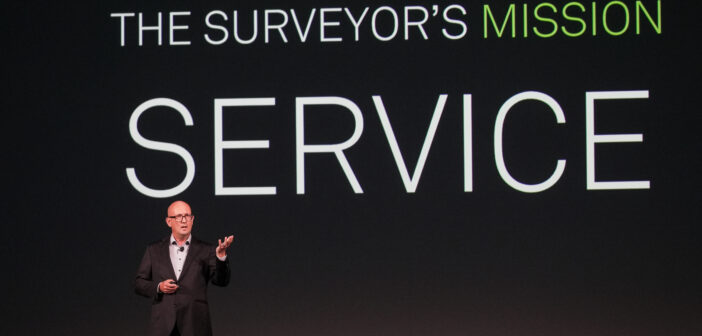“Passion for technology is not enough. Business acumen is not enough. Rigorous QA and QC procedures are not enough. Being a good surveyor, ultimately, is not good enough. Because at the core, a surveyor’s mission is service.”
With these words, Moritz Lauwiner, President of Hexagon Survey Solutions, challenged HxGN LIVE attendees to rethink their assumptions about what makes successful and innovative surveying services during his keynote, “Putting the Serve into Surveying.”
To provide resources alongside his challenge, Lauwiner consulted with three experts who contributed unique insights on developing service innovations, from characteristics that clients value, to the role of technology, to identifying and communicating your value to clients. We’ve gathered highlights from these interviews here so you can benefit from their advice and perspectives all in one place.
How do you approach the challenges of new technology integration and service innovation?
Derek Twente, Geospatial Manager at US-based engineering and surveying firm, TWM, led the successful integration of terrestrial laser scanning and later mobile mapping into the company’s service offerings, resulting in exponential business growth. He contributed insights on the potential risks and realised rewards of investing in laser scanning and strategies for developing new services despite the challenges.
Instead of viewing risk as the enemy to growth and innovation, Derek argues that it is an essential ally.
“Risk is a good thing,” says Derek, “We associate risk with fire – as long as it’s planned for, its beneficial. It just needs to be well calculated. It’s when it’s not planned for that it can be devastating.”
Especially when making large investments like TWM did to bring laser scanning into their tool base and service repertoire, having a focused yet flexible plan is essential.
“To help us mitigate risk,” continues Derek, “we wanted to know what success looked like when we got there, because we were not just looking to supplement the services we offered, but to get into new services and markets in new regions to completely diversify as a firm. So we made a business plan, reviewed it often, and modified it several times.”
Along this journey, Derek realised one crucial aspect of developing a service innovation:
“One of the biggest things we learned was that investment does not equal innovation.”
Rather, what enabled success for Derek and team was “meeting with and listening to clients and looking for ways to integrate the technology into their existing workflow. That was a selling point for us.”
What role does technology play in service innovation?
While new technology can certainly be an integral component to service innovation – and TWM has seen the benefit of technology for addressing their capacity issues – new tech alone is not enough. According to Derek, technology is only effective in supporting service innovation when deployed in the mission to solve client needs.
“It improves existing services and add new features to help solve our clients’ problems. And that’s why we’re here, that’s what we do – we solve our client’s problems. The technology ultimately is just a different set of tools to help do just that,” says Derek.
Technology can also help you scale your unique service offering and enter the competitive arena despite the size of your firm.
“One advantage we’ve seen is capacity – being able to capture more data with less people. Most firms currently struggle to find enough people,” reflects Derek.
“As the price comes down on some technology, we’re starting to see smaller firms able to invest and it levels the playing field with the larger firms a bit. What that does ultimately, is shift from a size factor to a service factor. The service we’re providing with that technology becomes the distinguishing factor.”
In addition to strong technical work, what qualities are important to you in a surveying service provider?
Doug Browning, the Senior Survey Project Manager at Walsh Construction and Archer Western, brings 10 years within the construction industry to his insights about what sets a surveying service provider apart. Among the top characteristics he looks for is communication:
“The key for me to delivering outstanding service is communication.”
“I want my subcontractor surveyors to be part of the team. I want them to be part of the daily meetings because surveying is such an integral part of everything we do on a construction site. It starts and ends typically with survey,” says Doug.
In addition to communication, Doug stresses that adaptability and flexibility are key attributes.
“I see subcontractors struggling to adapt to the schedules. Things can change on a moment’s notice – being flexible and available is a skill that is critical in our line of work,” explains Doug. “We spend a lot of time planning, but sometimes things happen and before you come out of a meeting, plans change, and you have to be able to adapt. Because in the end, that’s what we need to do for the project to move forward.”
How important is it for surveyors to adapt their processes and work with digital data?
Ensuring you can adapt your processes to work with digital data in ways that your clients need is also an important factor to consider as you evaluate your service offerings. In Doug’s experience, surveyors who can step into their digital processes have the competitive advantage.
“For me and my group, we try to utilise digital data as much as possible. We are working off 3D models and it would be great if they could work off the same model, where everything is apples to apples when we’re doing layout, so everything’s consistent,” says Doug.
“Having the surveyor able to utilise digital data [is important], whether receiving design files to deliverables. Sometimes decisions are made with data that surveyors are collecting in the field and those decisions are made real-time. So sometimes the old school ways or processes that worked in the past, might not be what we need to do now.”
How can surveyors overcome service innovation challenges?
Elaine Ball, Geospatial Marketer and founder of Elaine Ball Ltd., provides guidance to her clients on how to identify their service strengths, effectively value those services, and communicate that value to clients. An important refrain across her advice is that surveyors need to know their strengths and know their clients to overcome service innovation challenges.
“Know your audience, who is actually your buyer. This will help you understand your audience and create a marketing communications plan [that determines]what content they are going to take in and digest,” explains Elaine.
“Adding value and building trust are key parts of your communication plan.”
“But also knowing your own niche and being very specific by actually focusing on one skill set, which is also a key way of focusing your marketing.”
What is your recommendation to surveyors who want to scale their services?
Before undertaking any major scaling efforts, Elaine recommends accumulating cash reserves and narrowing down to scale up.
“Build up enough money – cash reserves – in your business that you’re comfortable, and then replicate,” Elaine advises.
Evaluate your key strengths, she emphasises, and scale based on what you excel in, replicating rather than reaching out into entirely new realms of service.
“Write out a list of all the things you’re good at and then select a few, whether it be sales, contract management, etc., and find somebody who can replicate exactly what you do for that job. Then suddenly, you’re doubling the amount of work you’re doing. Scale, but don’t go crazy. Scale bit by bit and focus on what you can replicate within what you’re really good at.”
To learn more about innovating your surveying services from Lauwiner and these expert interviewees, watch the full HxGN LIVE 2023 keynote, “Putting the Serve into Surveying.”














